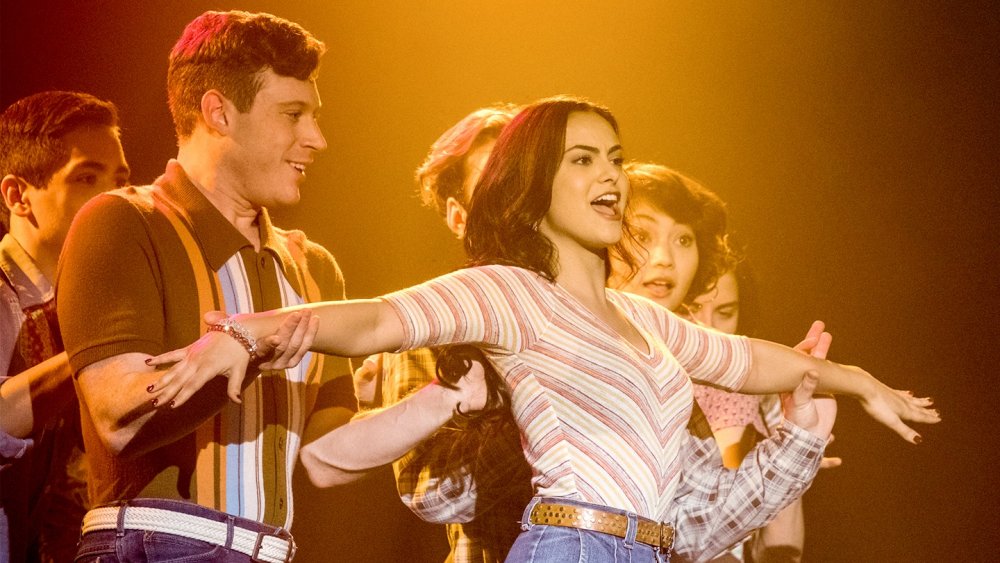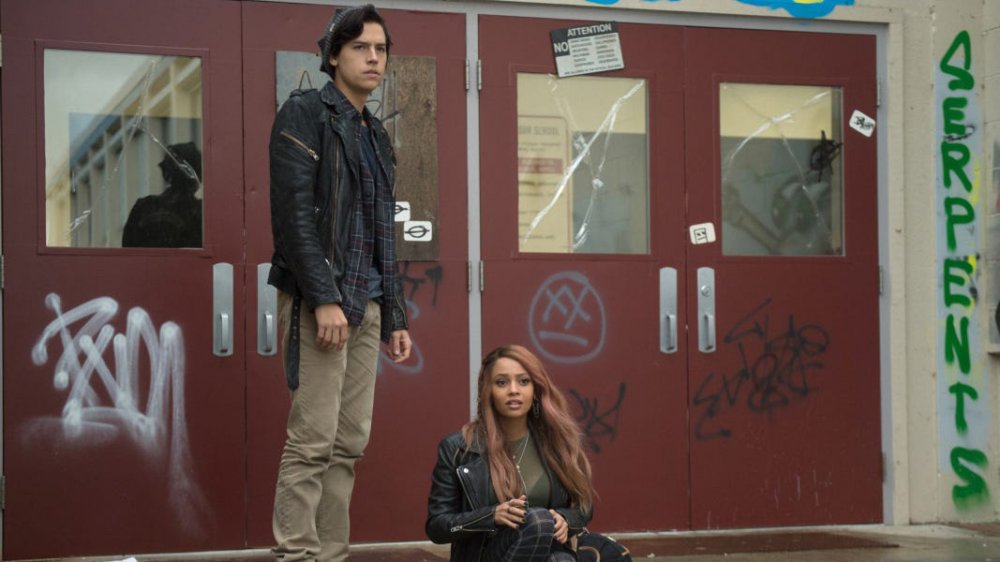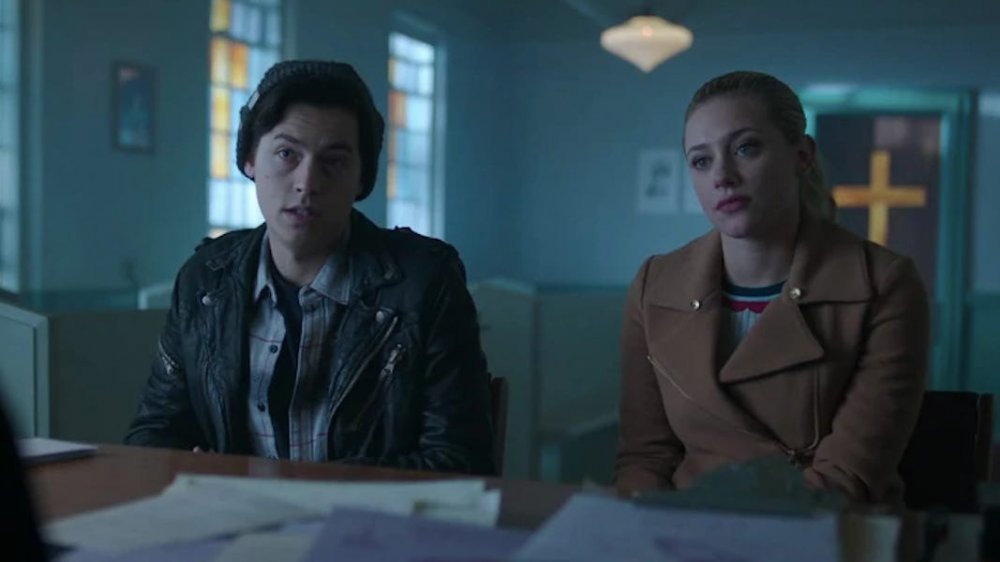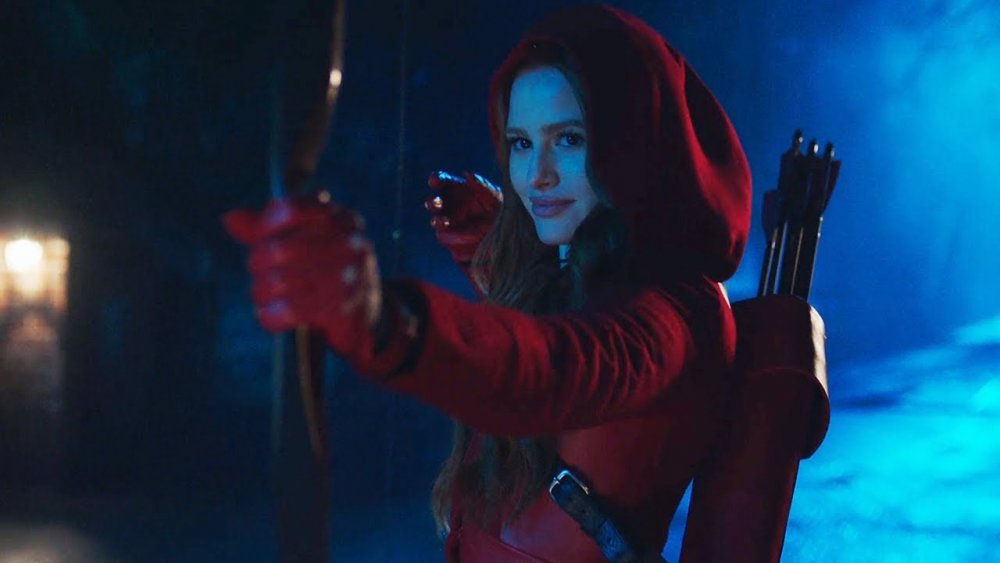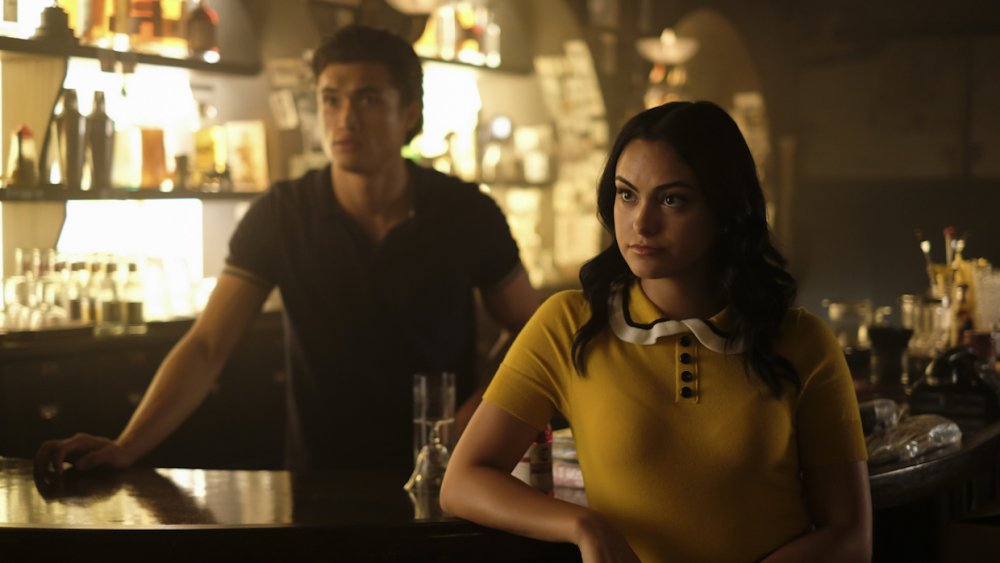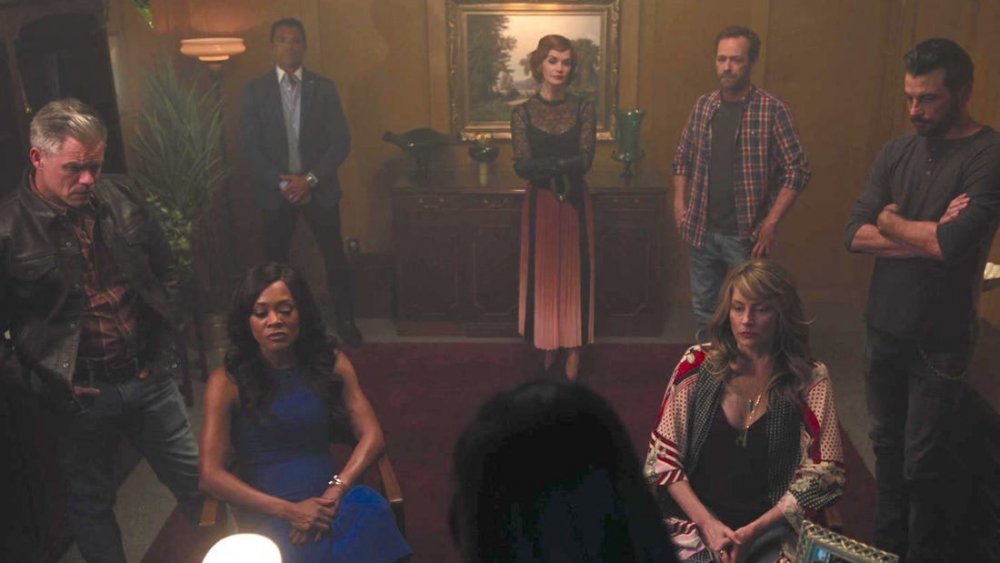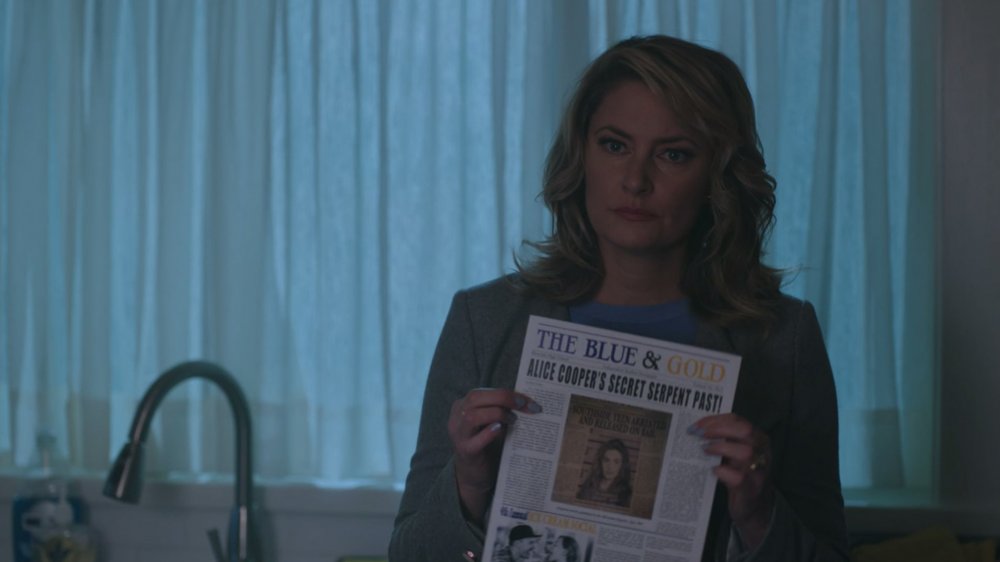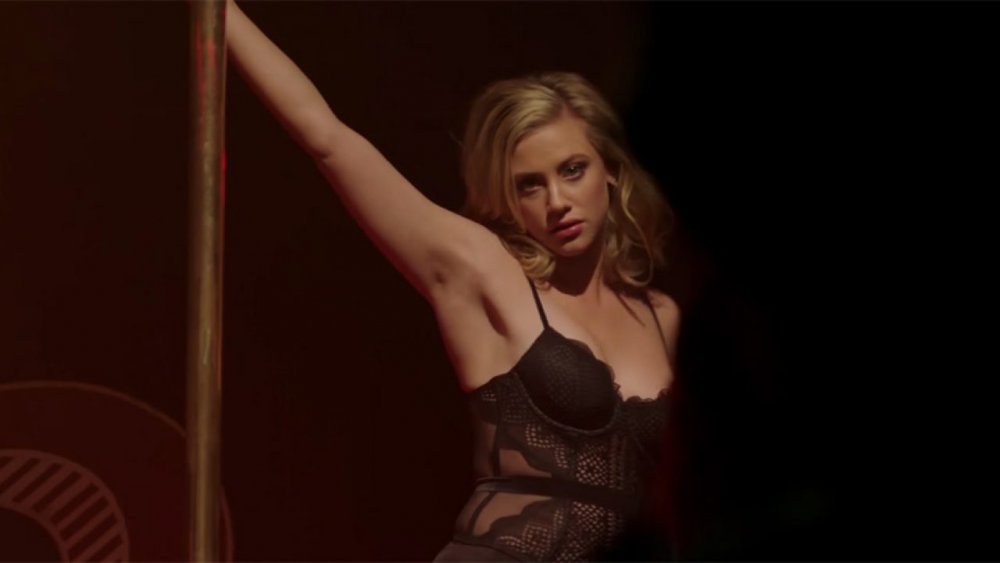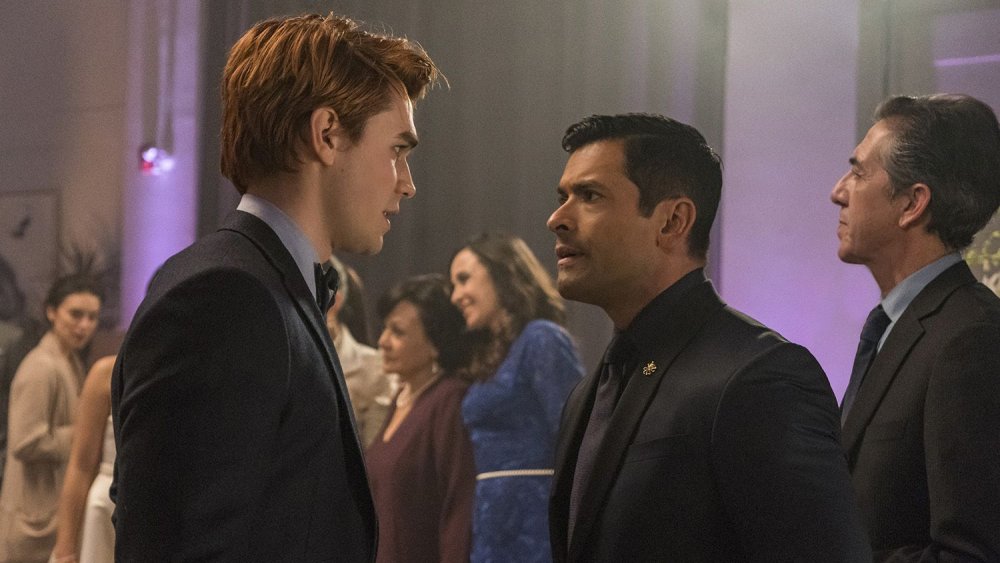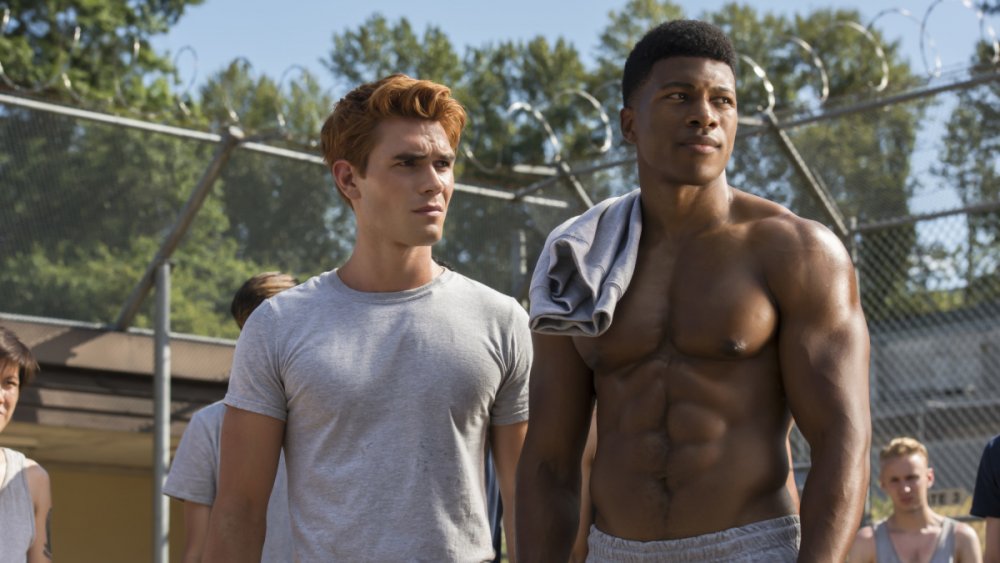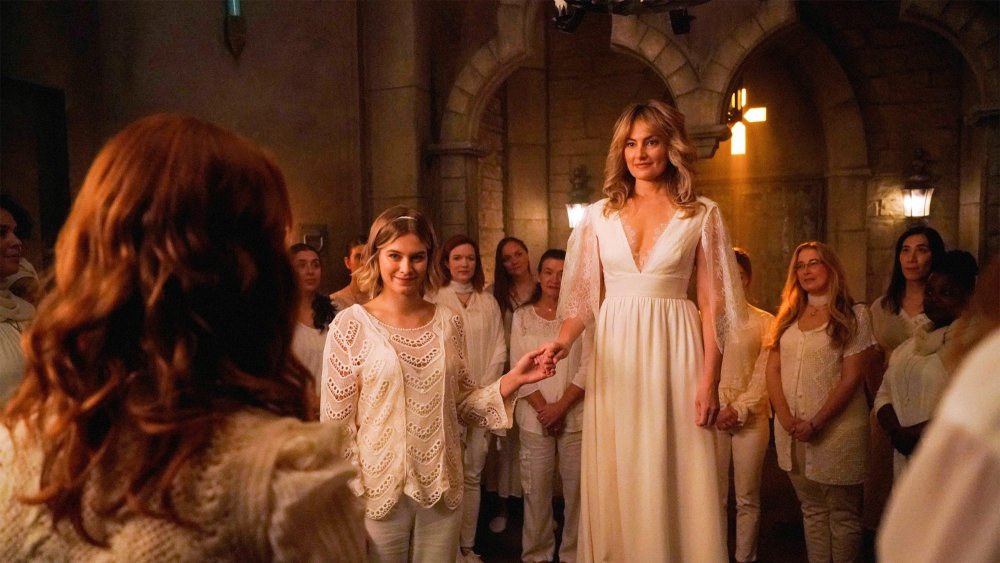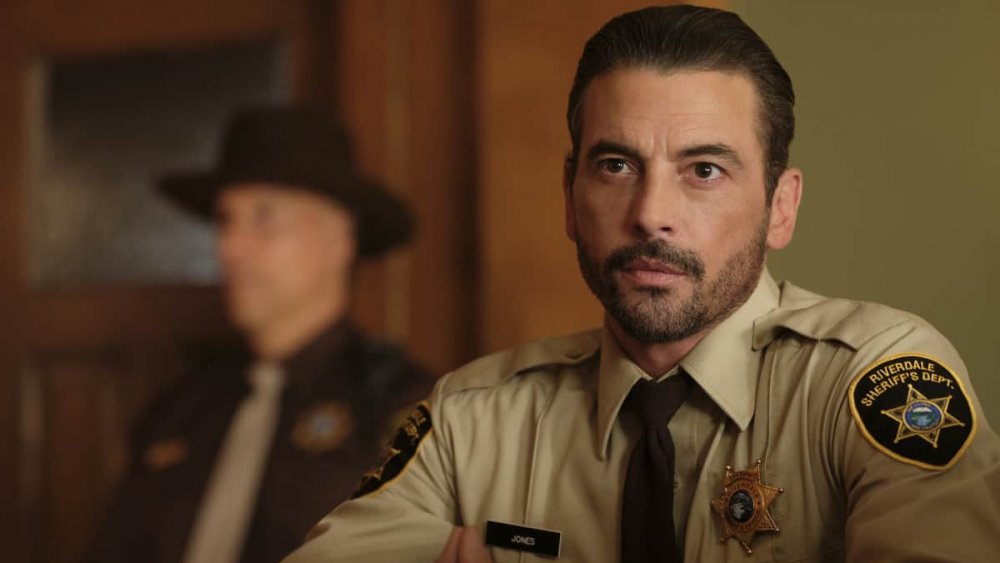Things That Make No Sense In Riverdale
To say that Riverdale, a teen drama based on the Archie comics, is a wild ride would be the understatement of the century. Unlike the show's relatively mundane early comics roots, Archie Andrews, Betty Cooper, Jughead Jones, and Veronica Lodge find themselves swept up in far more than just typical will-they-or-won't-they teen romances.
Of course, the show does feature plenty of relationship drama, high school politics, and other Degrassi-esque dilemmas. But between serial killers, political backstabbing, drug running, gangs, cults, mobs, abusive parents, and even the odd bear attack, Riverdale offers a perfect blend of campy absurdity and thrilling teenage adventure from the writer's room.
But while Riverdale makes it easy to not think too hard about the pure goofiness on display, some of what the show tries to sell is just so ridiculous it's hard not to dwell too hard on it. Here are some of the things that just don't make a lick of sense in Riverdale.
The three musical episodes
Musicals are a popular staple among tween and teen viewers. Disney's continual pop-star inspired sitcoms, made-for-TV movies, and the success shows like Glee and Smash prove that musical theater is alive and well among the teen demographic. So it only makes sense that showrunners appeal to musical-oriented teens. However, when watching High School Musical, you know from the start that you're sitting down to have a campy experience.
On the contrary, Riverdale features three musical episodes that come absolutely out of nowhere, having the cast break into song and dance by total surprise. It's not like the kids are simply performing musicals on stage within the episodes; they sing throughout the entirety of the show. It's as if, for only these three episodes, Riverdale is transformed into some heavily auto-tuned stage show, but without the appeal of a live audience or live performances.
Aside from the tonal whiplash, it's hard to believe that the school would allow the students to perform any of the three cult musicals chosen throughout the series. Carrie isn't exactly shy about its religious criticisms and child abuse. Heathers has multiple high schoolers murdered or die by suicide. Hedwig and the Angry Inch is highly controversial with a ton of unpleasant trauma explored in its narrative. It is doubtful that a group of disgruntled parents complained in a nosy, dramatic town like Riverdale, especially after the lead in the school's production of Carrie was literally murdered on stage.
Southside High
So in the city of Riverdale, there is a huge issue with economic inequality. And since this is a show that follows high schoolers, albeit high schoolers who hunt down serial killers and cults while solving murders, this manifests in rampant gang activity on the town's south side. The only trailer park shown in town is located there, and it's where a significant number of the Southside Serpents live.
In the United States, public schools receive their revenue from their district's property taxes. This means that Southside High likely doesn't get near the same budget as Riverdale High, and it shows, albeit to a comically exaggerated degree. Just about every single wall inside the school is covered in graffiti. Kids openly take Jingle Jangle (drugs) in the hallways. The teachers know that a ton of their students are active participants in gangs and even allow them to wear their gang insignias without issue.
Perhaps the most perplexing fixture of Southside High is the cafeteria. Most school cafeterias feature tables for students to sit and eat at, a few trash cans, and a place to put empty lunch trays. Southside High shakes up that formula by putting long stretches of chain link fencing in their cafeteria. It doesn't close one section of seating off or anything; it just sits in the middle of the lunchroom, menacingly vibing in the background. Maybe it's there to help separate gangs, but who really knows?
Betty is a terrible detective
Betty Cooper loves to brag about her Nancy Drew-like detective skills, and based on her track record of uncovering the killers operating in Riverdale, you might just mistake her for a hotshot crime reporter. But is Betty really all that good? Or is she just good because the show says she is?
Betty can be perplexingly dense when it comes to solving mysteries. In season one, she has no journalism or detective experience, so that's completely understandable. She and Jughead stumble their way into uncovering Jason Blossom's murder, and after that, she essentially dedicates most of her free time to investigative journalism and mystery-solving with Jughead. Considering both of her parents are reporters themselves (though it should be noted that Alice Cooper is a terrible interviewer and openly throws ethics to the side), she should probably start looking at her cases a bit more closely.
Case in point: The Black Hood killings. From the start, Betty should have at least suspected that the killer was someone very close to her. After all, the Black Hood knew details about her childhood that only someone familiar with intimate details about her upbringing would have been privy to — likely only someone in her family. Considering that it was also known that the killer was a white male that matched the physical description of her father, this probably should have at least made Betty a little bit suspicious, especially since she was already willing to suspect Hal Cooper as a suspect for Jason's murder in season one.
Cheryl's season two standoff against the Black Hood
Cheryl Blossom is a force to be reckoned with, even for a cold-hearted serial killer like the Black Hood. But not even Cheryl can bend time to her will, so when she suddenly changes into a red-hooded Katniss Everdeen in a blink of an eye, it's a bit hard to take seriously, even for a show as silly and over-the-top as Riverdale.
On a stormy night, Cheryl is home alone relaxing when the Black Hood makes his attack, fully intending to add Cheryl to his kill list. In a panic, she catapults out a second-story window, and in only a matter of seconds, she makes a full costume change offscreen, red leather gloves included. Not only that, but Cheryl is now sporting a bow and arrow set, meaning that she managed to not only to acquire a weapon but switch outfits for the occasion as well.
Considering she jumped out of a window and returned after what could probably only be 30 seconds at most, this is not possible. While we don't know where the bow was stored, it certainly wasn't in her room when we last saw her, so she had to have run and gotten it. So how far did Cheryl go? And how did she manage to get back so quickly? Cheryl may be impressive, but not that impressive.
Veronica runs a speakeasy
After Veronica obtains full ownership of Pop Tate's Chock' lit Shoppe from her father, she decides to revamp the iconic dining establishment's basement to revive its subterranean speakeasy, calling it La Bonne Nuit. Because who wouldn't want to go to a high schooler's cabaret?
At first, the club serves non-alcoholic beverages that mock the flavors of traditional cocktails. But even when Veronica explicitly says that La Bonne Nuit is not in the business of corrupting Riverdale's youth, Reggie, perhaps in a bit of foreshadowing, says, "Not yet."
Eventually, the speakeasy branches out from cover fees and soda/juice blends. Throughout the show's third season, La Bonne Nuit expands to illegal gambling and serving alcohol to its patrons (and not always checking IDs while doing so). Veronica dives into these shady revenue streams entirely after discovering that her father actually owns La Bonne Nuit. Even after Hiram is arrested, Veronica still serves alcohol downstairs, as evidenced when she uses it to burn a man alive in the fourth episode of the show's fourth season. Weirdly, the town completely tolerates the existence of a bar where high schoolers sell booze to their peers.
None of the parents act like parents
The parents in Riverdale run the gamut from being all-around totalitarians to just not being around their kids at all, usually staying on one or the other end of the spectrum with maybe one or two parents in the middle.
On the totalitarian end of the spectrum are parents like Alice Cooper, who are more like wannabe prison wardens. Alice repeatedly goes through Betty's diaries, dictates who she's allowed to talk to, and even gives Betty's college savings to a cult. Her father is even worse, having tried to groom her into forming a father-daughter serial killer team. A similar nightmare of controlling behavior can be found in the Blossom household.
However, most of the parents in Riverdale, from Sheriff Keller to Mayor McCoy, are just so busy at their jobs that they have virtually no time to parent their children. Other parents, such as FP Jones, Mary Andrews, and Myles Mccoy, either don't live in Riverdale or, in FP's case, let their kid couch surf while living apart from them and partaking in gang activity.
The only parents who step up to support and provide structure for their kids are Fred and Mary Andrews, and arguably Hermione Lodge before Hiram's return to Riverdale. But despite their words of encouragement and moral support, they still allow their children to walk around utterly unsupervised with few restrictions. If the teens in Riverdale act like foolish adults, it's fair to say the adults act like dumb high schoolers.
The high school newspaper is treated like an actual, well-established paper
It's common for many small towns to have one local newspaper — if any exist at all. The same is true of Riverdale, with the Riverdale Register employing an incredibly small staff, including Alice and Hal Cooper.
Even though the town already has a paper covering local events, the high school newspaper seems to be just as big of a deal in Riverdale. When Betty publishes a picture of her mother's old mugshot in the Blue and Gold, the whole town is enraptured. While it's not uncommon for small towns to rally around high school sports teams, it's exceedingly rare to see a similar fervor for high school journalism. The town's lack of investment in the local paper is even joked about by Jughead — when asking Alice to become the Blue and Gold's faculty advisor, he speculates that they likely have a larger operating budget than the Register.
A similar situation occurs when Jughead publishes an article in the Blue and Gold, revealing the genocidal roots behind Riverdale's founder. This complicates the celebration of the annual Pickens Day festival, spurring on a full-blown protest that Hiram Lodge has to dispel. This ultimately results in the statue of General Pickens being beheaded and a potential eviction notice for the trailer park residents who are blamed for the crime.
Meanwhile, the Riverdale Register hasn't been credited with breaking anything related to the political squabbles, cult activity, killings, or so forth. Yet the writers at the high school paper have managed to have a hand in uncovering every single mystery.
The Serpent initiation dance
When Jughead joins the Serpents, Betty is understandably afraid that she can't protect him from what lies ahead. She understands that she can't fully be involved with Jughead from outside the Serpents, so the only way to keep him safe is to become more involved with his Southside roots.
Betty's remedy surfaces in the form of the Serpent initiation dance, a tradition that female initiates take on to prove their worth. But the dance is a little risqué for a high school sophomore: Betty hops on a stripper pole, clad in black lingerie, and dances in front of a packed bar. To add further discomfort to the scene, Betty's mom is present for the show and is pretty much the only person to raise any concern.
Though Alice protests, she doesn't bring up issues about the sexualization of a minor in front of an adult audience. Instead, she's only worried about Betty joining the Serpents. While Betty joining a gang is indeed a fair concern, even this doesn't make much sense. Later in the season, Jughead asks Betty to be his queen and join the Serpents, implying that the dance meant absolutely nothing. So really, Betty's dance played out more like a weird fever dream than anything remotely meaningful to the story.
Hiram keeps using kids as part of his mob deals
Hiram Lodge is essentially Riverdale's version of Scarface. Even before Hiram hits town, he has a noted reputation as the big bad businessman with seemingly infinite money. It's no secret that Hiram is the head of Riverdale's most successful organized crime syndicate, operating with the mayor and the sheriff in his pocket, among other town institutions like the newspaper. What seems odd is just how often Hiram employs teenagers to do his dirty work.
While Hiram does employ a few grown men to handle protecting his family and running extralegal errands for him, Hiram seems to take a liking to Archie and makes him an honorary capo. In addition to using Archie, he also frequently pays off the local gangs, consisting largely of high schoolers from the south side of Riverdale, to strategically cause a ruckus around town or do illegal jobs.
It makes sense that Hiram wouldn't spend his time negotiating over worker contracts with an established union representing his employees who create and run drugs. Still, the degree to which he relies on children when the entire south side of town is full of economically desperate adults willing to do less-than-legal work is just an odd decision that leaves a lot of room for error.
The entire Juvie plotline
Archie's prison storyline begins with him refusing to shiv anyone and trying to bring the prisoners together because, according to Archie, fighting with each other is how the guards win. He does this by teaching the other prisoners about "the triumphs and defeats, the epic highs and lows of high school football," by organizing a pick-up game with the MVP winning his new shoes.
Veronica and the River Vixens even come to cheer on the game by singing and dancing just outside the fence. But before the show goes full The Longest Yard, the guards begin beating everyone senseless after declaring the game a prison riot. Archie is eventually conscripted into an underground inmate fighting ring a la Marvel's Luke Cage, where he becomes the warden's favorite torture subject and instrument.
After engineering a daring escape with his high school pals' help, Archie goes on the run and hides in a bunker in the middle of the forest. But not wanting his friends to be in danger because they were trying to protect him, Archie hits the road with Jughead as they skip out of town to escape the wrath of Hiram Lodge, the person who conspired to put him into Juvie in the first place. Quizzically, Archie continues with his self-imposed exile even after being informed that he's been exonerated.
The Farm
The Farm is referenced as early as season one as a safe haven where Polly can have her twins away from the Riverdale community's stigma and her overbearing parents. As the series continues, more hints are dropped about the mysterious Farm, hinting that there might just be something darker within its community.
In season three, the Farm infiltrates Riverdale and opens a new chapter at the high school. The entire community is suddenly attending Farm meetings, participating in ritualistic behavior, making donations to the Farm, and cutting off their friends and family. It becomes clear to Betty, whose mother and sister are deeply invested with the Farm, that the group is a cult and that Riverdale has been compromised.
While an entire town becoming swept up in a cult overnight is outlandish in and of itself, the more absurd notion is the Farm's organ-harvesting operation. Working in tandem with the Sisters of Quiet Mercy, an abusive home for wayward women, the Farm is harvesting its members' organs in secrecy. The Sisters of Quiet Mercy in and of itself should have sent up a million red flags, considering they have an extensive history of abuse that is known to everyone in town who is familiar with their practices. Throw in the fact that the FBI is already investigating the Farm as well, and the operation is just too big and too contrived to be believable, at least at the scale and pace that it's operating under.
FP Jones becomes sheriff
When we're first introduced to FP Jones, it's clear that he has a shady past. Aside from being the Serpents' leader and his difficulties in being a reliable father for Jughead and Jellybean, FP is an accomplice to Jason Blossom's murder. After spending some time behind bars for his crime, FP jumps right back into the Serpent lifestyle, which largely revolves around initiating, leading, and even orchestrating wars between impressionable high school kids.
All of Riverdale knows exactly who FP is and what he does. However, FP is literally handed the position of sheriff in season three by Hermione Lodge. While it would be great to give FP the benefit of the doubt, he makes the bizarre decision of enlisting the Serpents, a group of literal high schoolers, and deputizes them. In exchange for high school credit and some cash on the side, the gang members he leads work for the sheriff department. The whole premise is just so nonsensical that it could only happen on Riverdale.

